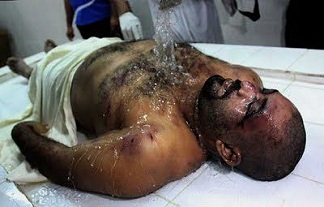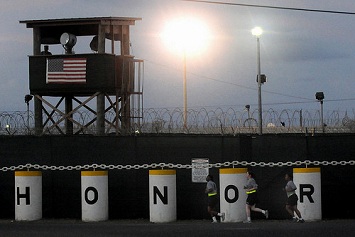Understanding the U.S. Torture State
The United States and Torture: Interrogation, Incarceration, and Abuse edited by Marjorie Cohn (New York University Press: 2011), 342 pages.
When I was a child in Reagan’s America, a common theme in Cold War rhetoric was that the Soviets tortured people and detained them without cause, extracted phony confessions through cruel violence, did the unspeakable to detainees who were helpless against the full, heartless weight of the communist state. It was torture as much as any evil that differentiated the bad guys, the commies, from the good guys, the American people and their government. However imperfect the U.S. system was, it had civilized standards rejected by the enemy.
In April 2004, the world was shocked to see photos exposing the torment of prisoners at Abu Ghraib, one of Saddam Hussein’s most infamous prisons, which was taken over and used by the United States in Operation Iraqi Freedom. Well, most of the world was shocked. Some, mostly conservative commentators, dismissed or defended the barbarity, even comparing it to frat-boy hazing. Others were disgusted but shrugged it off as the work of a few bad apples, not something that should draw judgment down on the whole of U.S. policy and the brave men and women in uniform. Still others of us were horrified but did not see the mistreatment as any sort of aberration — we expected such torture to occur in a war of aggression, figured we had not seen the worst of it, and even argued that what goes on in America’s domestic prisons easily compares with some of the milder photos dominating the nightly news.
A national debate arose out of that scandal. More than one question was pondered: Do these photos depict torture? Is this an anomaly or a systemic problem? Who should be held accountable? Should torture always be illegal?
Over the next few years, more torture controversies came up. The question of whether water-boarding actually constitutes torture was particularly disheartening. Some defenders of the U.S. government said the United States should not and does not torture, but waterboarding doesn’t count. Others said that even if the United States does torture, it is doing so in service of a greater good.
We have actually come to the point where the rhetoric of Reagan’s day no longer holds: American exceptionalists and conservatives no longer claim emphatically that the United States does not and never will torture, as they did before (however disingenuously). An AP poll in June 2009 found that 52 percent of Americans thought torture was justified in some situations — up from only 38 percent in 2005. In Obama’s America, torture is now normalized.


































